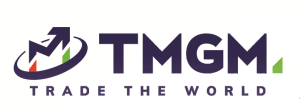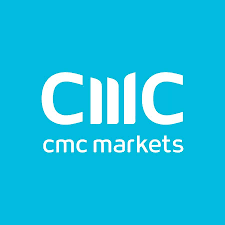Forex brokers are middlemen who provide a platform for trading financial instruments. Their services connect traders to the financial market, making them crucial when it comes to trading.
It is important to note that while forex brokers play a vital role in financial instruments trading, there are some brokers who are fraudulent and scam traders of their money. To avoid this, you should only trade with regulated brokers as they are obliged by law to protect clients’ funds and provide transparent and fair trading services.
The Financial Markets Authority (FMA) is the agency of the government of New Zealand that regulates the activities of forex brokers in New Zealand and sets out their rules for operations. The FMA rules are in place to protect traders based in New Zealand, so you can complain to them at any time if a broker violates the rules, and they will help you get redress.
However, if you trade with a broker that is not regulated by FMA, the agency will not be able to protect you as the said broker is not in its jurisdiction and therefore not obliged to follow the FMA rules.
In this post, we will examine six forex brokers regulated by FMA in New Zealand and compare their offerings as of October 2024. We will look at regulation dates, account types, minimum deposits, fees (trading & non-trading), available tradable instruments, trading platforms and customer support.
Comparison of FMA Regulated Forex Brokers
| Broker | FSP Number | Authorised Since | Min. Deposit | Visit |
|---|---|---|---|---|
| Plus500 | FSP486026 |
2016
|
NZ$200
|
Visit Broker |
| TMGM | FSP569807 |
2018
|
NZ$100
|
Visit Broker |
| BlackBull Markets | FSP403326 |
2020
|
NZ$0
|
Visit Broker |
| CMC Markets | FSP41187 |
2014
|
NZ$50
|
Visit Broker |
| IG Markets | FSP684191 |
2022
|
NZ$100
|
Visit Broker |
Note: The average/typical spread and the minimum deposit is as per information on these brokers’ websites in October 2024. Please see the general trading conditions below.
Best FMA Regulated Forex Brokers
Here are 2024’s best FMA-regulated forex brokers in New Zealand:
- Plus500 – FMA Regulated Forex Broker with 24/7 Customer Support
- TMGM – FMA Regulated Broker with Commission-Free Trading
- BlackBull Markets – FMA Regulated Broker with No inactive account fees
- CMC Markets– FMA Regulated Broker with Wide Range of Instruments
- IG Markets – FMA Regulated Broker That Is A Stock Exchange Listed Company
#1 Plus500 – FMA-Regulated Forex Broker with 24/7 Customer Support
Plus500 is regulated in New Zealand by FMA as Plus500AU Pty Ltd. and licensed to operate as a Derivatives Issuer with FSP number FSP486026, issued in 2016.
Account types: Plus500 has only one account type for clients in New Zealand, which is the Retail Account with maximum leverage of 1:30. You can only open individual accounts with this broker. Plus500 offers negative balance protection to traders, which means you cannot lose more than your deposits even if you suffer a loss in a trade.
Fees: Trading fees on Plus500 are spreads, currency conversion fees, and swap fees. Plus500 does not charge commissions on all instruments. Plus500 offers free deposits and withdrawals but charges dormant accounts after 3 months of inactivity.
Tradable Instruments: Financial instruments that you can trade on Plus500 New Zealand are CFDs on forex currency pairs, shares, indices, commodities (oil, metals, and agriculture), cryptocurrencies, options, and ETFs.
Deposits/Withdrawals: You can deposit and withdraw from Plus500 with cards, e-wallets and bank transfers. Cards and e-wallets deposits are credited instantly and it takes up to 5 days for bank wire transfers. Withdrawals are processed within 1-5 business days and may take more days for you to receive funds.
Trading Platforms and Support: Plus500 supports a proprietary trading application – Plus500 Trader. The application is available on the web version, desktop and mobile devices (iOS and Android). Plus500 offers 24/7 Customer support via live chat, email and social media for traders in New Zealand.
#2 FMA Regulated Broker with Commission-Free Trading
TMGM is regulated in New Zealand by FMA as Trademax Global Markets (NZ) Limited and licensed as a Derivatives Issuer (DI) with Financial Service Provider (FSP) number FSP569807, issued in 2018.
Account types: Account types available on TMGM are the Edge and Classic Accounts. You can also apply for an Islamic account features. The maximum leverage on Exness is 1:200. You can choose to upgrade your account on the platform by completing a questionnaire, after which you can access leverage of up to 1:400 on major FX pairs.
Fees: Trading fees charged by TMGM are spreads, commissions on Edge Account, and swap fees. While the Classic Account is spread only, the Edge Account offers lower spreads but charges commission. TMGM does not charge any fees for deposits or withdrawals, and there is no account inactivity fee.
Tradable Instruments: Available financial instruments on Exness in New Zealand for trading are CFDs on forex currencies pairs, precious metals, shares, energies commodities, indices, and cryptocurrencies.
Deposits/Withdrawals: Payment methods supported on TMGM for deposits and withdrawals in New Zealand are cards (debit/credits), e-wallets (PayPal, Skrill), and local internet banking. Deposits via cards and e-wallets are credited instantly while it takes 1-3 business days for bank transfer deposits to be credited. Withdrawals to e-wallets are instant while it takes up to 1-3 business days for bank accounts. Card withdrawals are currently not supported.
Trading Platforms and Support: The broker supports the MT4 and MT5 trading applications and IRESS Viewpoint web application. You can access the platforms on the web, desktop or mobile devices except IRESS Viewpoint which is only available on web. Customer support of TMGM is available 24/7 via live chat and email for New Zealand traders.
#3 BlackBull Markets- FMA Regulated Broker with No Inactive Account Fees
BlackBull Markets is regulated Derivatives Issuer in New Zealand by the FMA as Black Bull Group Limited with Financial Services Provider number FSP403326, issued in 2020.
Account types: There are 3 Account types offered by BlackBull Markets. They are ECN Standard, ECN Prime and ECN Institutional. You can apply for Islamic features on your account. The maximum leverage on BlackBull Markets is 1:500, which applies to forex pairs, other instruments have lower leverage limits. BlackBull Markets offers negative balance protection for traders.
Fees: Trading fees charged by BlackBull Markets are spreads, swap fees and commissions. BlackBull Markets charges commission fees on only when using the ECN Prime and ECN Institutional Accounts. ECN Standard Account types does not pay commissions on trades.
BlackBull Markets does not charge fees on deposits and some withdrawal methods. Fees are charged when withdrawing funds via e-wallets, cards and international bank transfers. You are also charged a fee if you decide to withdraw funds after making a deposit without placing any trade. However, the broker does not charge any dormant account fees.
Tradable Instruments: You can trade CFDs on forex pairs, indices, futures, agriculture commodities (soybean, coffee, and others), cryptocurrencies, shares, energies and metals on BlackBull Markets New Zealand.
Deposits/Withdrawals: Payment methods supported on BlackBull Markets are cards, e-wallets (Skrill, Neteller) and local bank transfers. Deposits via these methods are credited instantly for cards and e-wallets, while it takes 1-3 business days for bank transfers.
Withdrawals made to bank accounts take about 1-3 working days to receive. It takes 24 hours to receive withdrawals to e-wallets and cards.
Trading Platforms and Support: The broker supports the MT4 and MT5 trading application, TradingView and a proprietary trading application – BlackBull Shares. You can access the platforms on the web, desktop or mobile devices. BlackBull Markets offers customer support to traders in New Zealand via live chat, email and phone which is available 24/6.
#4 CMC Markets – FMA Regulated Broker with Wide Range of Instruments
CMC Markets is regulated by FMA as a Derivatives Issuer in New Zealand under the name ‘CMC Markets NZ Limited’ with FSP No 41187, issued in 2014.
Account types: There are 2 main account types on CMC Markets in New Zealand, the are CFD Account and Corporate Account. They also offer a premium account status ‘Alpha Account’, which is conditional after meeting some trading criteria, you get extra benefits with this account, such as dedicated account manager.
The maximum leverage on CMC Markets is 1:500. CMC Markets offer negative balance protection for clients in New Zealand.
Fees: CMC Markets fees include spreads, swap fees and commissions (only when trading shares).
The broker does not charge a fee for deposits or withdrawals. If your account becomes dormant for 12 months (that is you do not place any trade for 1 year), the broker charges a monthly inactive account fee.
Tradable Instruments:Financial instruments on CMC Markets are CFDs on forex currency pairs, commodities (oil, metals and agriculture), cryptocurrencies, indices, bonds and shares.
Deposits/Withdrawals:Payment methods supported for deposits and withdrawals on CMC Markets New Zealand are e-wallets (Skrill, Neteller, PayPal), cards, and local bank transfer. Deposits can take 1 to 2 business days for bank transfer, they are instant for cards and e-wallets.
Withdrawals from CMC Markets are processed within 1-2 business days for local bank transfers and e-wallets, while it takes 3-5 business days for cards.
Trading Platforms and Support: The broker supports the MT4 trading application and a proprietary ‘CMC Markets Trader’ which are available on the web, desktop and mobile devices (Android & iOS).
CMC Markets offers customer support to clients via email and local phone number for 24 hours from Monday Morning to Saturday Morning. Online live chat support is available during working hours from Monday to Friday.
Why choose a FMA Regulated Forex Broker?
Choosing an FMA-regulated forex broker in New Zealand has some benefits. The FMA regulation mandates forex brokers to protect your funds, ensure ethical practices, and offers clear channels for dispute resolution within New Zealand in case you have an issue with a broker.
Forex brokers that are regulated in New Zealand by FMA are subject to strict oversight, which promotes a safer and more reliable trading environment. While forex trading always has some risk, FMA regulation helps to minimize the risk associated with the forex broker practices.
Note that some forex brokers may be operating without regulation in New Zealand, it is best to avoid such brokers as trading with them will be at your own risk with no protection from the Financial Markets Authority (FMA).
How Does FMA Protect You?
The Financial Markets Authority (FMA) is the financial regulator to issue licenses to forex brokers and other businesses in the financial sector. The aim of FMA is to protect investors and traders based in New Zealand and ensure financial service providers treat them fairly. Here are some of the ways FMA regulations protect forex traders in New Zealand.
1) Segregation of funds: One of the FMA rules for forex brokers is for them to keep clients’ funds in a separate account different from the account used for running the operations of the company or broker. This means that the money you deposit into your trading account for investment is not saved in the same account the broker uses for operations. This is to ensure the safety of clients’ funds and prevent the broker from using your money for day to day running of their business.
2) Complaints Handling: The FMA provides a channel for traders to lodge complaints against forex brokers that are practicing something that is not fair to clients. You can submit complaints and FMA will take appropriate action to investigate the situation and resolve it and may issue some sanctions against the broker or compel them to compensate the trader.
3) Leverage Restriction: The FMA is in the process of releasing new guidelines that will serve as Standard Conditions for the operations of brokers in New Zealand. One of the new conditions will be leverage restriction, this means that brokers will be mandated to limit the amount of leverage made available to retail traders. Currently, brokers can offer leverage of up to 1:500, but this new conditions will limit leverage to about 1:30 (margin of 3.33%). This is aimed at helping traders minimize the losses in trading.
These are some of the benefits of trading with FMA-regulated forex brokers in New Zealand. In jurisdictions where forex is unregulated or the laws are not strict, traders tend to lose more morning.
How Do You Check if your Broker is Regulated with the FMA?
It is important to find out if a forex broker is regulated before you create an account and start using their platform.
This is how to verify a forex broker’s FMA regulation in simple steps. Let’s use CMC Markets for the example:
Step 1) On the broker’s website, you should scroll to the bottom of the page to know if they are regulated by FMA. All brokers usually state it. This is also important as their trading name may be different from the name they are regulated under. See an example with CM Markets below
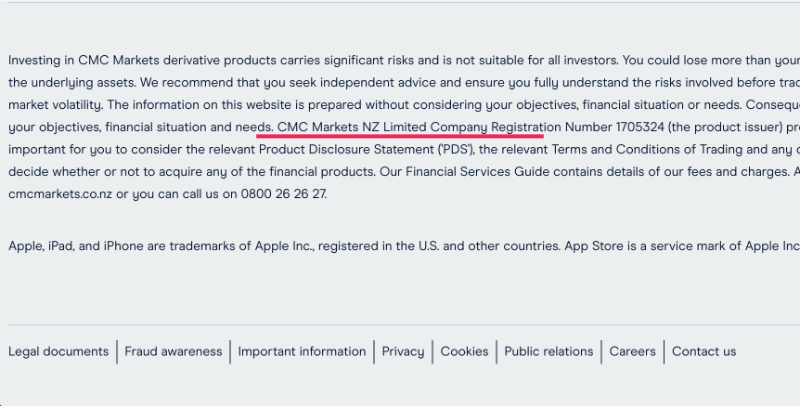
Step 2) Go to FMA’s website at www.fma.govt.nz and click ‘Licensed and reporting entities’.
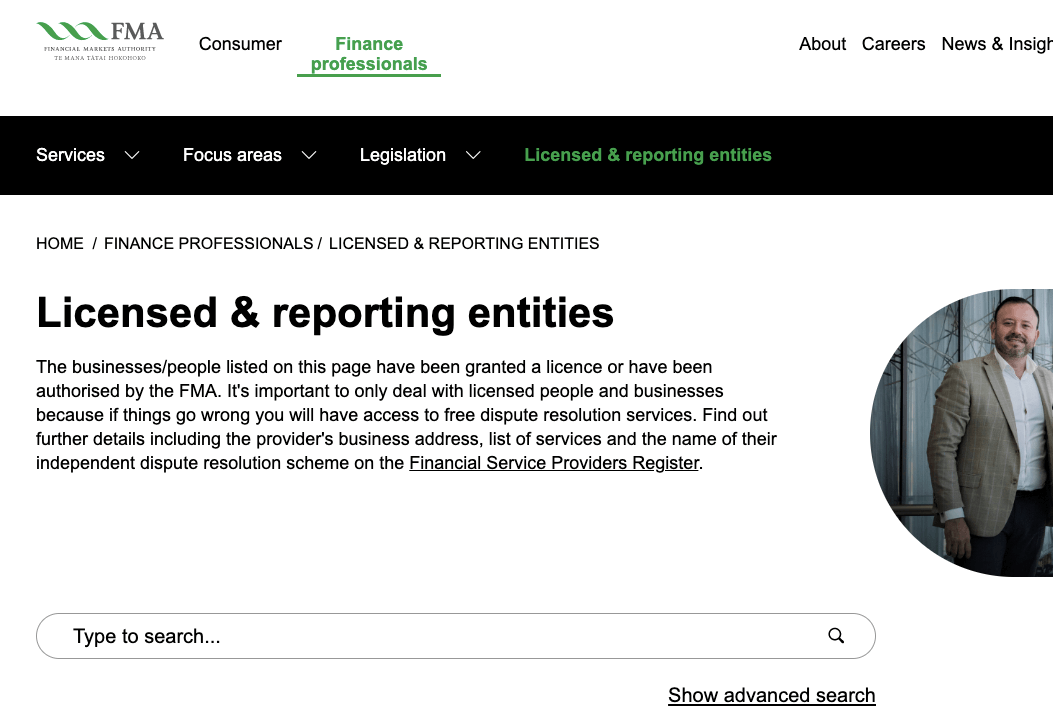
Step 3) Type in the name of the broker, as seen on their website footer, in the search box and click ‘Submit’.
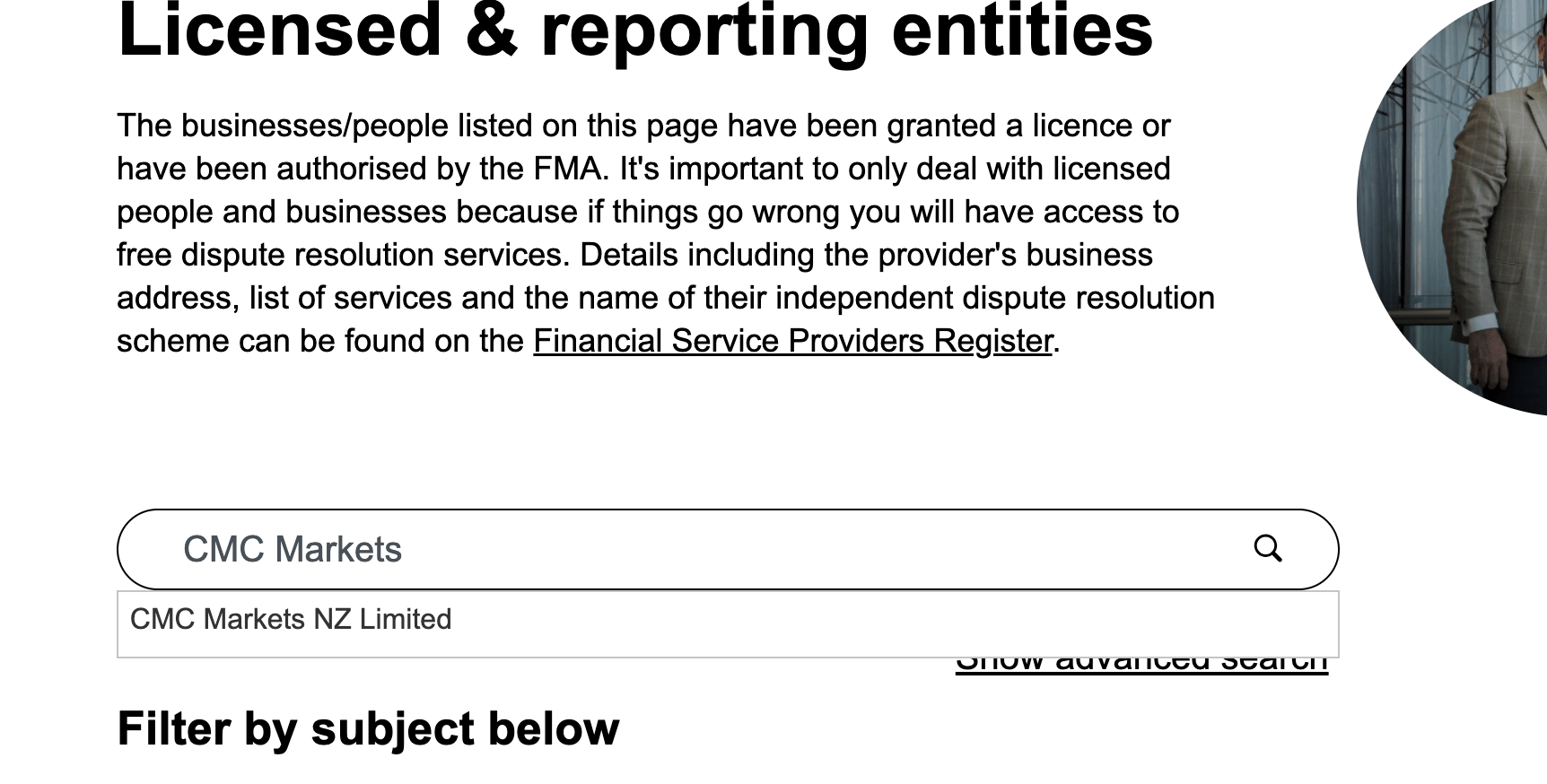
Step 4) The name of the broker will appear with basic information like the FSP number.
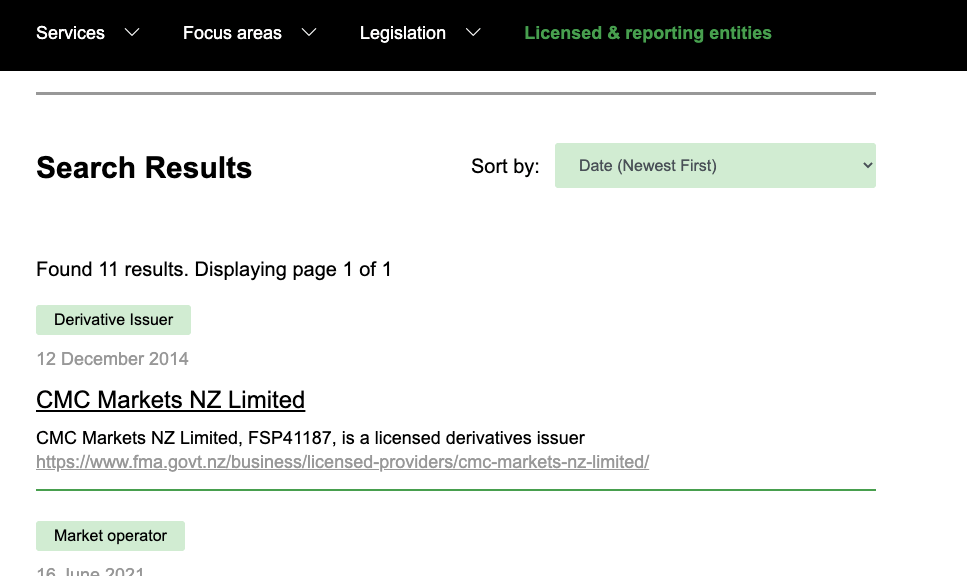
Step 5) Click on the name to see more information about the broker such as the license date and status.
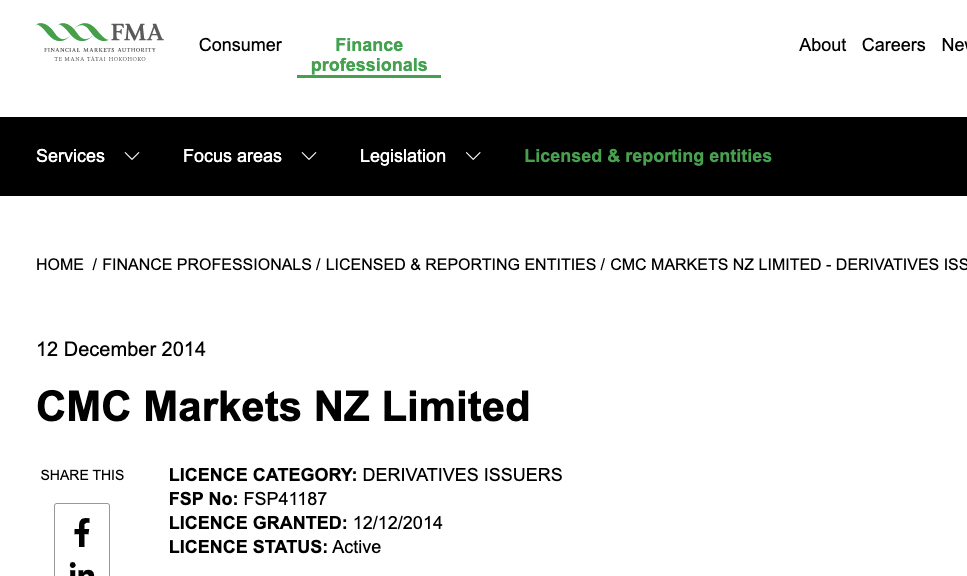
How to Manage Risks with Forex Trading
Forex trading involves risks and you could lose all your money, it is best that you avoid trading forex CFDs, unless you have experience and understand them.
In New Zealand, the FMA does not make it compulsory for forex brokers to offer negative balance protection, this means that you can lose more than the capital you invested and will be required to deposit additional money to clear the balance.
However, you can use the following strategies to manage the risks of trading:
1) Use lower leverage: While leverage can amplify profits, it can also increase your losses. It is advisable that you do not use all the leverage available to you, as this exposes you to more risks.
2) Use Stop Loss Orders: A stop-loss order automatically exits your trade position when the price reaches a level that you set, this helps to limit potential losses. Setting stop-loss orders helps to maintain discipline and prevents emotional trading decisions.
3) Position Sizing: Do not commit too much to a single trade. Allocate your capital in percentages for different trades, this ensures your account is diversified and can mitigate some risk if the market moves too fast against you.
4) Practice with a Demo Account: Ultimately, if you are starting out, before putting your real money and facing the risks, use demo accounts to learn more about the CFDs trading market and test your risk management strategies. This will allow you to experiment in a risk-free environment with risk-free virtual money.
5) Keep Learning and Stay Up-To-Date: The forex CFDs market is always changing due to several reasons and events. It is best to stay updated with recent economic news, central bank policies (of the currencies you are trading), and technical analysis techniques. This will help you to make informed decisions and change your risk management strategies as needed.
FAQs on Best FMA Regulated Forex Brokers
Is forex and CFD trading regulated in New Zealand?
CFDs and Forex trading is regulated in New Zealand by the Financial Markets Authority (FMA). FMA issues the Capital Markets Services license to forex brokers in New Zealand.
Which brokers are registered with FMA?
Plus500, CMC Markets, Blackbull Markets, IG Markets, and TMGM, among others are forex brokers licensed by FMA in New Zealand.
How do I trade FX in New Zealand
To trade FX in New Zealand, you have to create a trading account with any of the regulated forex brokers in New Zealand. Some of them are Plus500, CMC Markets, TMGM, and others.
Do FMA-regulated brokers offer Islamic accounts?
Yes, brokers regulated in New Zealand by FMA offer Islamic Accounts. BlackBull Markets and TMGM are some of the forex brokers that offer Islamic Accounts to traders, such accounts are usually swap-free for a specific period.

